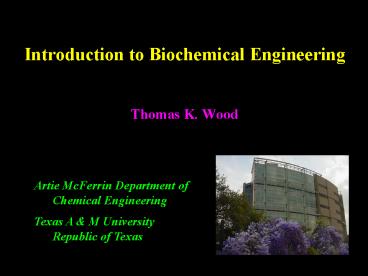Introduction to Biochemical Engineering - PowerPoint PPT Presentation
1 / 15
Title:
Introduction to Biochemical Engineering
Description:
Artie McFerrin Department of Chemical Engineering. Texas A & M University Republic of Texas ... von Bayer 1890 chemical synthesis dominates currently (5th ... – PowerPoint PPT presentation
Number of Views:1872
Avg rating:3.0/5.0
Title: Introduction to Biochemical Engineering
1
Introduction to Biochemical Engineering
- Thomas K. Wood
Artie McFerrin Department of Chemical
Engineering Texas A M University Republic of
Texas
2
Glucose to Hydrogen
3
The FHL Complex
PfdhF
Phyc
Phyp
PhydN
hyc operon
UAS fdhF
hyp operon
UAS hydN
hypF I G
E D C A A B D
E fhlA fdhF
hydN
H F B
C
Hydrogenase 3 and electron transport proteins
CO2 H
HycE has a Ni-Fe active site with 2CN CO
ligands requires 7 maturation proteins
2H
H2
Adapted from K. Bagramyan, A. Trchounian, Biochem
(Moscow) 68 (2003)
4
Hydrogen from E. coli
Results H2 produced by BW25113 hyaB hybC hycA
fdoG/pCA24N-FhlA can power a 0.6 W fuel cell and
20 mW fan.
5
Gasoline from Bacteria
- LS9, Inc. of California converts a bacterium
into a gasoline-producing machine - The best replacement for petroleum is petroleum
6
Indigo and Indirubin
- Indigo is one of the oldest textile dyes
- A 200 million market
- Evolution of indigo production methods
- ? originally extracted from various plant
sources - ? von Bayer 1890 chemical synthesis dominates
currently - (5th Nobel Prize in chemistry)
- ? bacterial synthesis developed 1983 for
naphthalene dioxygenase - Indirubin is a pink pigment and has important
and potential therapeutic applications (used to
treat chronic myelocytic leukemia)
7
A. Rosenzweig et al. Proteins 25141-152, 1997
- Polymer of 1500 units (amino acids)
- Each position there are 19 possibilities
- (20 building blocks, 1 already used)
- 191500 possibilities (101918)
8
DNA Shuffling
PCR w/o primers
W/T or error-prone PCR for HycE
DNA synthesis
Anneal
(Pfu polymerase)
1st cycle
DNase I (Random digestion)
3
5
3
5
Denature
2nd cycle
5
10-50 bp size fragments
5
3
3rd cycle
3
5
CentriSep column
5
3
30 cycles
KpnI
EcoRI
5
3
KpnI
EcoRI
3
5
PCR w/ primers
5
3
3
5
5
3
3
5
3
5
Taq/pfu polymerase
3
5
5
3
3
5
5
3
Fragments cloned into suitable vector
3
5
Resulting genes include different mutations and
combinations of mutations
9
ToMO Catalytic Residues
10
Green Chemistry
TomA3 V106A
Canada, Iwashita, Wood, J. Bacteriol. 184344,
2002.
11
Color Chemistry
12
Colored Compounds Extracted from TOM Variants
Cell of Saturation Mutagenesis at Position 113
Standard
Rui, Reardon, and Wood, Appl. Microbiol.
Biotechnol. 66 422-429, 2005.
13
Importance of Substituted Dihydroxybenzenes
Use as important precursors for pharmaceuticals
and the agrochemical industry
NO2 (nitro), CH3 (methyl), OCH3 (methoxy)
glycitein (plasma cholesterol lowering)
triptycene quinones
(anti-leukemia drugs)
combretastatin A-1 and B-1 (antivascular agents)
14
Controlling the Regiospecific Ring-Hydroxylation
of Toluene
Wild-type TpMO 90 p-cresol 10
m-cresol
A. Fishman, Y. Tao, L. Rui, and T. K. Wood, J.
Biol. Chem. 280506-514, 2005.
15
Successive Hydroxylations
- Discovered T4MO is capable of 3 successive
hydroxylations - (also TpMO, TOM, and ToMO)
- Previously, thought that T4MO can only perform
single hydroxylation of substituted benzenes at
the para position - rates of all reactions similar
- substituted dihydroxybenzenes
trihydroxybenzenes are available by simple
hydroxylations with high regiospecificity
Tao, Fishman, Bentley, and Wood, Appl. Environ.
Microbiol., vol 703814, 2004.

